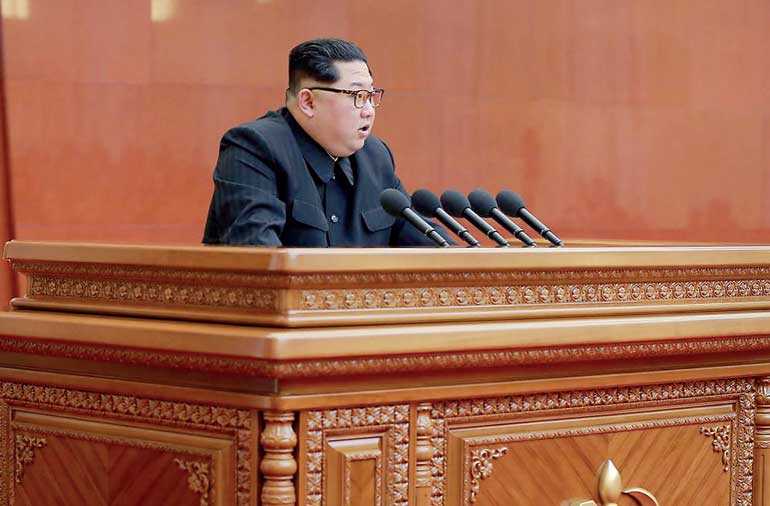Tuesday Feb 17, 2026
Tuesday Feb 17, 2026
Monday, 23 April 2018 00:00 - - {{hitsCtrl.values.hits}}

North Korean leader Kim Jong Un speaks during the Third Plenary Meeting of the Seventh Central Committee of the Workers’ Party of Korea (WPK), in this photo released by North Korea’s Korean Central News Agency (KCNA) in Pyongyang on 20 April 2018. KCNA/via Reuters
Seoul (Reuters): North Korea will immediately suspend nuclear and missile tests and scrap its nuclear test site and instead pursue economic growth and peace, the North’s state media said on Saturday (21 April), ahead of planned summits with South Korea and the United States.
North Korean leader Kim Jong Un said his country no longer needed to conduct nuclear tests or intercontinental ballistic missile tests because it had completed its goal of developing nuclear weapons, the Korean Central News Agency (KCNA) said.
North Korea said that to create an “international environment favourable” for its economy, it would “facilitate close contact and active dialogue” with neighbouring countries and the international community.
It was the first time Kim directly addressed his position on North Korea’s nuclear weapons programs ahead of planned summits with South Korean President Moon Jae-in next week and with US President Donald Trump in late May or early June.
The pledge to halt the development of nuclear weapons, initiated by his grandfather and continued by his father, would mean a significant reversal for the young, third-generation leader, now 34, who has staked his security on his nuclear arsenal and spent years celebrating such weapons as an integral part of his regime’s legitimacy and power.
A testing freeze and commitment to close a test site alone would fall short of Washington’s demand that Pyongyang completely dismantle all of its nuclear weapons and missiles.
But announcing the concessions now, rather than during summit meetings, shows Kim is serious about denuclearisation talks, experts say.
“The northern nuclear test ground of the DPRK will be dismantled to transparently guarantee the discontinuance of the nuclear test,” KCNA said after Kim convened a plenary session of the Central Committee of the ruling Worker’s Party on Friday (20 April). The North’s official name is the Democratic People’s Republic of Korea (DPRK). The Pyunggye-ri site in northern North Korea is its only known nuclear test site, where all of its six underground tests were conducted, including the last, its largest-ever detonation, in September.
“We will concentrate all efforts on building a powerful socialist economy and markedly improving the standard of people’s living through the mobilisation of all human and material resources of the country,” KCNA said.
Trump welcomed the statement and said he looked forward to a summit with Kim.
“North Korea has agreed to suspend all Nuclear Tests and close up a major test site. This is very good news for North Korea and the World - big progress! Look forward to our Summit,” Trump said on Twitter.
“Progress being made for all!” he said in a later tweet.
South Korea said the North’s decision signified “meaningful” progress toward denuclearisation of the Korean peninsula and would create favourable conditions for successful meetings with it and the United States.
China, North Korea’s sole major ally which has nevertheless been frustrated by its defiant development of weapons, welcomed the announcement saying it would ease tension and promote denuclearisation.
“The Chinese side believes that North Korea’s decision will help ameliorate the situation on the peninsula,” a foreign ministry spokesman, Lu Kang, said in a statement.
Japanese Prime Minister Shinzo Abe also welcomed the North Korean statement but said it must lead to action.
“What’s important is that this leads to complete, verifiable denuclearisation. I want to emphasise this,” Abe told reporters.
The United States, Japan and South Korea have historically been the main targets of North Korea’s anger.